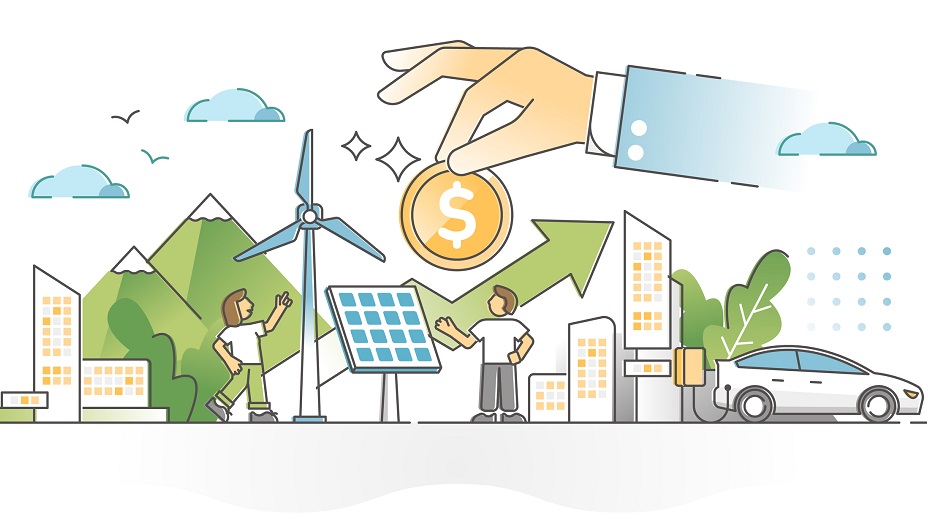Endorsing green goals, Net Zero, the “climate science” and so on has been the simple if spineless path for corporations in recent decades, even those in the fossil fuel business, because it was nothing but vague feel-good stuff that would only matter many years down the road. But objects in calendar are closer than they appear, and in addition to the energy crisis hammering consumers in Europe and increasingly North America, it seems some big banks have made a shocking discovery. It wasn’t just PR and make-believe. Going woke on climate could well mean going broke. As the Financial Post put it, “‘Immoral and irresponsible’: U.S. banks threaten to leave Mark Carney’s green alliance over legal risks”. We are tempted to sneer, but instead say “Better late than never”. Although since these are commitments they took on just a year ago, from a combination of inertia and invertebria, we say it with a soupcon of “duh”.
Attempts to repeal the laws of economics are as futile as attempts to repeal the laws of physics. And while the latter might seem less common, the entire alternative energy project has essentially required us to do so, disregarding how much can be extracted from a given source, what kind of footprint will be involved, the losses in various stages of transmission and conversion and the waste products created. And it is these considerations that, ultimately, enforce the laws of economics, especially the one about there being no free lunch, which really is a restatement of the 2nd Law of Thermodynamics.
What many banks are now realizing is that they risk being dragged into court, and bankruptcy, for failing to violate that law. As the Financial Post observes, “More than 450 finance companies accounting for US$130 trillion of assets have joined GFANZ [Carney’s “Glasgow Financial Alliance for Net Zero”], which is co-led by the Canadian ex-Bank of England governor and current Brookfield Asset Management Inc. executive.”
It seemed so cool. But now “‘I am close to taking us out of these global green commitments — I’m not going to allow third parties to create legal liabilities for us and our shareholders. It is immoral and irresponsible,’ one senior executive at a United States bank said. ‘What if we get it wrong, make a mistake or someone lies? Then the bank can be sued, that is an unacceptable risk.’”
So what went wrong? Well the usual bullying overreach and inflexibility:
“The banks’ biggest concern is over strict targets on phasing out coal, oil and gas introduced over the summer by the UN’s Race to Zero campaign, a UN-led net zero standard-setting body that accredits pledges made by Carney’s alliance. The body will soon be able to take action against financial companies for failing to hit targets, which could lead to them being kicked out of GFANZ, the FT reported last month.”
Which might be the best thing to happen to them given the risks of staying in.
It won’t be the only one. “Banks’ legal departments are particularly anxious about tougher U.S. Securities and Exchange Commission rules around climate-risk disclosures and commitments proposed by SEC chair Gary Gensler in February.”
It’s also not just the United States. “European banks including Santander Bank NA have also expressed misgivings. The potential loss of some of the world’s biggest and most influential banks would be a serious blow for Carney’s GFANZ group, which was formed last year and took centre stage at the COP26 climate talks in Glasgow in November.” And “A European bank executive said that ‘there is no way we are joining any new ESG groups, we don’t control them’ and echoed their U.S. counterparts’ fears about lawsuits due to the SEC’s renewed focus on ESG and emissions reporting.”
Reuters “Sustainable Switch” tried to spin it as “Banks feel the heat during Climate Week” in an email linking to a story claiming “Four days in and Climate Week has exposed plenty of division in the banking sector” with some fleeing in terror and others rushing in. But it did concede that European Central Bank supervisor Anneli Tuominen had uttered a threatlike object: “If banks do not meet the targets they have announced or follow the climate strategy they have communicated, they expose themselves to litigation and reputational risks”.
In addition to legal risks, there’s the usual problem of big-government do-gooders not appreciating just how big a burden they place on normal people’s normal activities including banking. According to the Financial Post, “The SEC will soon require formal disclosures in annual reports about governance, risk-management and strategy with respect to climate change. Companies will also have to disclose and be held accountable for any targets or commitments made, with detailed plans on how to achieve them. Bankers say that the proposed SEC rules could add hundreds of pages to annual reports and require a small army of extra accountants and lawyers to produce and vet the data, which they contend is not yet reliable or properly codified.”
There are other familiar problems as well. “Bankers complain that the demands placed on them are not supported by equally robust government action on climate change, nor does the technology exist that hitting some of the net zero targets will rely on. They also point out the lack of GFANZ members from China, Russia and India — three of the world’s top carbon-emitting countries.”
Again, we could ask pointedly why they are only mentioning these concerns now. But having realized that continuing to go along to get along would mean going broke, we hope they’ll draw some larger lessons about the obtuse unworkability of the alarmists’ proposals, from lack of international cooperation to lack of technology to lack of sound science.



The Banksters, urged on by Carney and the climate warriors, have become the useful idiots of the climate division of Gang Green. Given that net zero could only be achieved in a depopulated, deindustrialized, filthy, wood burning, stone age subsistence economy (basic hard metals require fossil fuel inputs), along with the epistemological mush of ESG, it's about time the word fraud was considered relevant. This morning, while trying to eat my cereal, BNN Bloomberg allowed John Kerry to spew his praise for the European advances in sustainable green energy and how he has plans (I don't recall electing him for such a role) for the rest of the planet to follow suit, I was thinking that zealots really can't accept reality even when disaster is right in their face.
No, no, no, they never promised us that their green agenda would be free! No, they promised us plentiful well-paying jobs, cheaper energy, and more in carbon rebates than we pay in carbon taxes. We got the opposite of what was promised. Marriage isn't the triumph of hope over experience; government is.